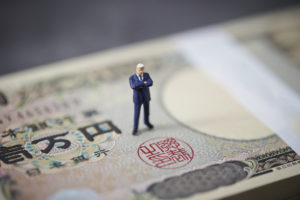 Ryohei Yanagi is a self-styled untypical Japanese business person – not only is he holding down several jobs – as CFO of Eisai pharmaceutical company and also a Visiting Professor at Toyo University and a Visiting Lecturer at Waseda University, but he has changed employers in his career, even more unusually switching from a foreign company (UBS) to a Japanese company, rather than the other way round.
Ryohei Yanagi is a self-styled untypical Japanese business person – not only is he holding down several jobs – as CFO of Eisai pharmaceutical company and also a Visiting Professor at Toyo University and a Visiting Lecturer at Waseda University, but he has changed employers in his career, even more unusually switching from a foreign company (UBS) to a Japanese company, rather than the other way round.
ROE of 8% was not plucked from nowhere
He is also a very dynamic speaker, and not low on ego. In his talk to the Daiwa Anglo-Japanese Foundation earlier this month he claimed credit for setting the ROE target of 8% in the Ito Review instigated by Prime Minister Abe as part of his Abenomics structural and governance reforms. Yanagi was criticised for plucking this figure out of nowhere, which was seen as unrealistic given that ROE in Japan had been averaging at just over 5% over the past 30 years.
He took us through his research, to point out that the Price Book Ratio only moves into positive territory (in other words the company is valued on the stock market at a higher rate than the cash and assets it has) when ROE is 8% in Japan. Apparently investors are discounting cash held by Japanese companies by 50%, because they fear that the company might make a stupid investment, and overpay, or just sleep on the cash instead of using it productively. By contrast, US companies’ average ROE over the past 28 years has been around 14%.
Shareholder value destruction rooted in Japan’s main bank governance system
Yanagi sees the root cause of this shareholder value destruction as being the main-bank governance system that used to dominate Japanese blue chip companies – whereby each major company had a “main bank” from one of the keiretsu, who provided most of their funding, governance and cross shareholding along with other keiretsu members. This main bank system was crumbling even before the Ito Review set the ROE target and other corporate governance reforms. Foreign shareholders now represent the largest shareholder group on average – owning around 30.8% of listed Japanese companies’ shares, up from less than 10% 30 years’ ago. Since the governance reforms of 2012-2015, Japanese companies’ ROE has increased to 9% and the Price Book Ratio has become positive.
Of course this analysis provoked quite a lot of questioning from the audience – many of whom were investing in Japanese companies, and had qualms about any notion that Japan should adopt wholesale the Anglo Saxon short term shareholder value maximization model. Yanagi was not saying that Japanese companies should drop their commitment to the environmental and social elements of ESG, but should look at the return on equity of such initiatives too.
An investment in a Japanese company is not just an investment in the Japanese economy
He gave the example of Eisai’s commitment to manufacturing – for free – medicine to eliminate the neglected tropical disease lymphatic filariasis. He believes Eisai will see a return to the cost of this, as it will increase the capacity utilization of Eisai’s factory in India, and improve their skills, and this factory then has the capability to produce other profit making drugs which can be exported to Europe.
There are quite a few investment funds in the West focused on Japan, and also several funds that exclude Japan because of its historically low returns. Most emphasise that they are aiming for long term capital growth, rather than quick returns. Usually they define a “Japanese company” as listed in Japan, or if listed elsewhere, having the majority of their business in Japan. As mentioned in another post, looking at companies like Takeda or SoftBank, or at this increase in foreign shareholdings, and more emphasis on return on equity – I do wonder whether the definition needs to be refined further.
An investment in a Japanese company is not just an investment in the Japanese economy. Many Japanese companies have the majority of their revenues from outside Japan. Takeda has more non-Japanese than Japanese executives. Whilst no shareholder should tolerate value destruction, the Japanese company’s traditional long term perspective, with emphasis on positive environmental and social contribution, rooted in specifics of the Japanese market and society, and now with added improved corporate governance, is surely an attractive one.
For more content like this, subscribe to the free Rudlin Consulting Newsletter. 最新の在欧日系企業の状況については無料の月刊Rudlin Consulting ニューズレターにご登録ください。
